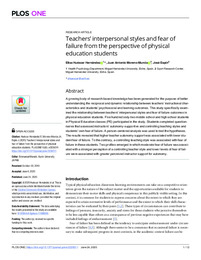Por favor, use este identificador para citar o enlazar este ítem:
https://hdl.handle.net/11000/38440
Teacher's interpersonal styles and fear of failure from the perspective of physical education students
Título :
Teacher's interpersonal styles and fear of failure from the perspective of physical education students |
Autor :
Huéscar Hernández, Elisa
Moreno-Murcia, Juan Antonio
Espín, José |
Editor :
Public Library of Science |
Departamento:
Departamentos de la UMH::Psicología de la Salud |
Fecha de publicación:
2020-06 |
URI :
https://hdl.handle.net/11000/38440 |
Resumen :
A growing body of research-based knowledge has been generated for the purpose of better
understanding the reciprocal and dynamic relationship between teachers’ instructional characteristics
and students’ psychosocial and learning outcomes. This study specifically examined
the relationship between teachers’ interpersonal styles and fear of failure outcomes in
physical education students. Five hundred sixty-two middle school and high school students
in Physical Education classes (PE) participated in the study. Students completed questionnaires
that assessed instructors’ autonomy-supportive and controlling teaching styles and
students’ own fear of failure. A person-centered analysis was used to test the hypotheses.
The results revealed that higher teacher autonomy support was associated with lower student
fear of failure. To the contrary, a controlling teaching style was associated with fear of
failure in these students. Two profiles emerged in which moderate fear of failure was associated
with a stronger perception of a controlling teacher style and lower levels of fear of failure
were associated with greater perceived instructor support for autonomy.
|
Palabras clave/Materias:
Teacher's styles
Students
Fear of failure
Physical education
Autonomy |
Tipo de documento :
info:eu-repo/semantics/article |
Derechos de acceso:
info:eu-repo/semantics/openAccess
Attribution-NonCommercial-NoDerivatives 4.0 Internacional |
DOI :
https://doi.org/10.1371/journal.pone.0235011 |
Publicado en:
PLos ONE, Vol. 15, Nº 6 (2020) |
Aparece en las colecciones:
Artículos- Psicología de la Salud
|
 La licencia se describe como: Atribución-NonComercial-NoDerivada 4.0 Internacional.
La licencia se describe como: Atribución-NonComercial-NoDerivada 4.0 Internacional.
 La licencia se describe como: Atribución-NonComercial-NoDerivada 4.0 Internacional.
La licencia se describe como: Atribución-NonComercial-NoDerivada 4.0 Internacional.
.png)
